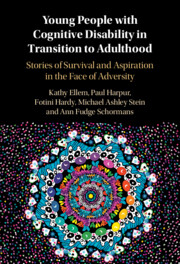 Young People with Cognitive Disability in Transition to Adulthood
Young People with Cognitive Disability in Transition to Adulthood Book contents
- Young People with Cognitive Disability in Transition to Adulthood
- Young People with Cognitive Disability in Transition to Adulthood
- Copyright page
- Dedication
- Epigraph
- Contents
- Figures
- Tables
- Preface
- Acknowledgements
- Chapter 1 Introduction
- Chapter 2 Violence against Young People with Cognitive Disability
- Chapter 3 Working in Partnership with People with Lived Experience
- Chapter 4 Amethyst’s Story
- Chapter 5 Experiences of Young People with Cognitive Disability
- Chapter 6 The Many Faces of Violence
- Chapter 7 Young People and the National Disability Insurance Scheme
- Chapter 8 Don’t Give Up on Us
- Chapter 9 Housing, Home, and Mental Well-Being
- Chapter 10 Young People’s Experiences of the Child Protection and Criminal Justice Systems
- Chapter 11 Having Someone in Your Corner
- Chapter 12 In the Voices of Participants
- References
- Index
Chapter 8 - Don’t Give Up on Us
Young People’s Experiences of Education and Employment
Published online by Cambridge University Press: 06 February 2025
- Young People with Cognitive Disability in Transition to Adulthood
- Young People with Cognitive Disability in Transition to Adulthood
- Copyright page
- Dedication
- Epigraph
- Contents
- Figures
- Tables
- Preface
- Acknowledgements
- Chapter 1 Introduction
- Chapter 2 Violence against Young People with Cognitive Disability
- Chapter 3 Working in Partnership with People with Lived Experience
- Chapter 4 Amethyst’s Story
- Chapter 5 Experiences of Young People with Cognitive Disability
- Chapter 6 The Many Faces of Violence
- Chapter 7 Young People and the National Disability Insurance Scheme
- Chapter 8 Don’t Give Up on Us
- Chapter 9 Housing, Home, and Mental Well-Being
- Chapter 10 Young People’s Experiences of the Child Protection and Criminal Justice Systems
- Chapter 11 Having Someone in Your Corner
- Chapter 12 In the Voices of Participants
- References
- Index
Summary
Young people with cognitive disability found school to be both good and bad. Things were good when young people had friends and when teachers listened and tried to help. Things were bad when the school wanted young people with cognitive disability to be like everyone else. Young people could be punished or neglected if they didn’t fit in with everyone else. Leaving school could be hard. Young people with cognitive disability often didn’t have a job or university to go to. The United Nations Convention on the Rights of Persons with Disabilities says that all people with disability have a right to a good education, and that people should be supported to get a job or to learn more after school.
Keywords
- Type
- Chapter
- Information
- Young People with Cognitive Disability in Transition to AdulthoodStories of Survival and Aspiration in the Face of Adversity, pp. 155 - 168Publisher: Cambridge University PressPrint publication year: 2025
